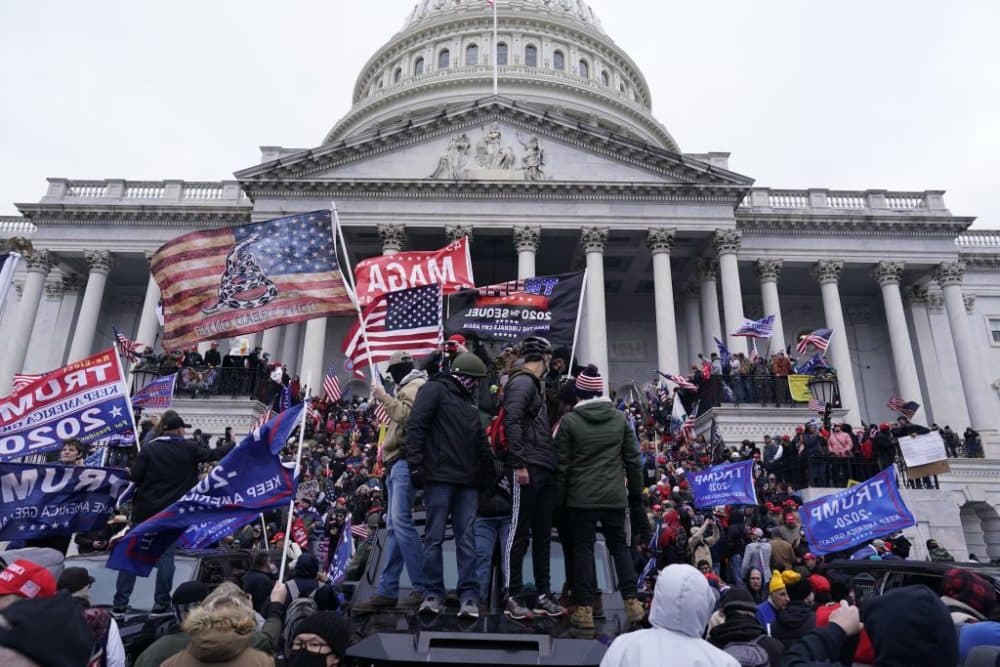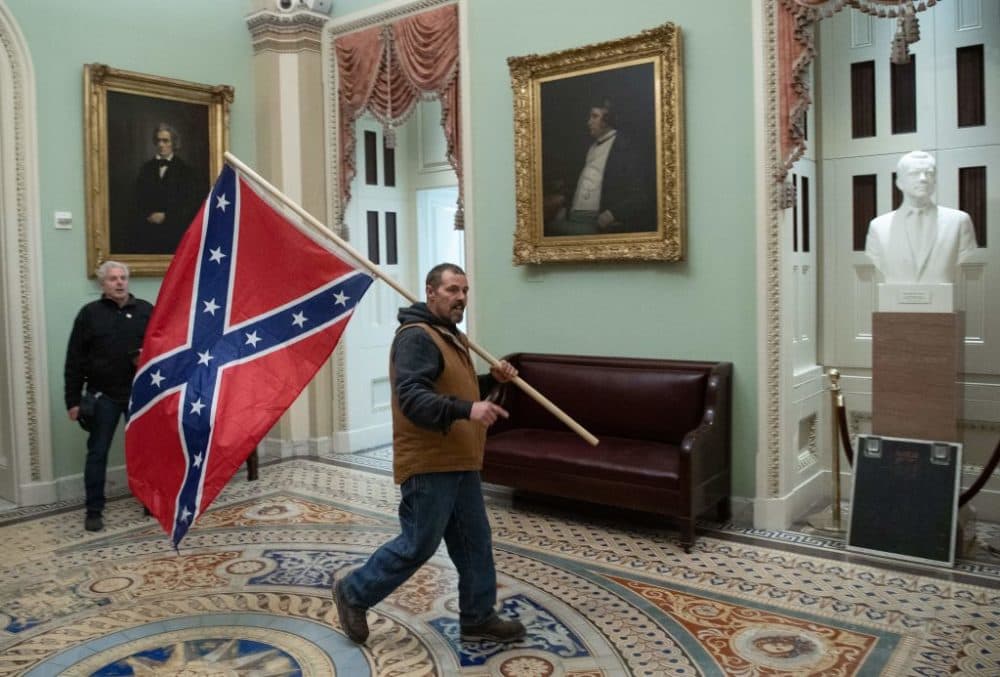Advertisement
Commentary
Spare Me Your Outrage, Your Shock. This Is America

I stood in my kitchen and watched the news for hours on Wednesday. As daylight faded, I ate stale chocolate chip cookies for dinner.
At times I was alone, or with my husband and three daughters who range in age from 4 to 10 years old. A familiar dance ensued: answer the girls’ questions, check Instagram and Twitter, text friends to check in on their physical safety and mental health, read the “we renounce these horrific acts” emails from various institutions where I work, or volunteer, or send my children.
Then I write or help to draft some of those very letters, try to hold space for the collective shock of some friends — the same shock I hear echoed by every white newscaster who comes on the screen. I do this dance I’ve come to know well, one that leaves no time to process why I feel so little at all.
“Mommy, who’s that?”
“Why is Trump allowed to Tweet that?”
“Why are the police doing nothing??”
I am a diversity, equity, and inclusion educator and consultant. I help schools, organizations, and parents work towards individual and systemic change. Sometimes, my daughters’ questions are the toughest of all.
The rhetoric that it’s just a few “bad apples” has been baked into our American pie.
I appreciated the speed with which President-elect Biden addressed the nation and called on Trump to end the siege. But in the same speech he also proclaimed, “Let me be very clear, the scenes of chaos at the Capitol do not reflect a true America, do not represent who we are.” I found that very troubling.
Let me be very clear: This is America.
Our inability to acknowledge this truth of our history fuels the very fire that we are furiously claiming no part in having helped set. This is our business as usual.
The insurrectionists who entered the Capitol this week were sent by the president, allowed in by law enforcement (who even posed for selfies with the intruders), and steeped in the rhetoric of the white supremacy upon which this country was founded. A noose hung outside the Capitol and the Confederate flags waved throughout the day are clear symbols of the American story so many people refuse to confront and teach our children.
Advertisement
Instead we scramble to distance ourselves from that truth; from “them.” We draw false dichotomies: Democrat/Republican, North/South, racist/not-racist. The rhetoric that it’s just a few “bad apples” has been baked into our American pie.
As former presidents condemned the violent, anti-democratic scene, they, too, drew their own flawed lines in the sand. President Bush likened what he saw to “how election results are disputed in a banana republic.” The irony is the complete disregard of a legacy of U.S imperialism that led to the very instability Bush condemns elsewhere — but never in his America. There is, too, the anti-Muslim rhetoric that fueled Bush’s “war on terror,” whose deadly repercussions continue today. President Clinton placed the blame squarely on the shoulders of Trump and the past four years, ignoring his own responsibility for upholding white supremacist systems, through legislation like the crime bill that spurred on mass incarceration.
Of course, Wednesday’s attempted coup and violence, and the current president’s role in it must be condemned. Loudly. Yet we must also stop trying to otherize racism and white supremacy. Take for example the email my daughter’s principal sent out to the school community. It began, “No matter where each of us leans politically …” That’s all I needed to read to know that it would not name systemic racism — that it would use the vague language that keeps white parents comfortable.
No. We do not get to wash our hands of our complicity in what happened this week simply because we voted Democratic or didn’t storm into the Capitol. Racism is in all of us.
As a light-skinned person who is East Asian and white, I often grapple with when to lead and when to follow, when my silence is self-care and when it is violence. Yet, speaking up cannot be the sole burden of certain people — Black, Indigenous, trans — who have been saying all of this long before I was born.

I went to bed with most of Wednesday’s work undone. I awoke to a familiar heaviness. Just as the assault on our democracy was not a one-off aberration, somehow divorced from “real” America, neither is the pain of people of color who have to wake up to yet another morning after, and then be asked to explain, even justify, that pain to others. What was laid bare as the world watched — the inaction of law enforcement, the validation of white rage, the raised fist of a U.S. senator in solidarity with those outside the Capitol, the 147 Republicans (across the House and Senate) who still voted to overturn election results — is not a surprise to so many of us who have been screaming, for years, that this was going to happen.
We don’t want your shock, we want your action.
Name anti-Blackness and white supremacy wherever it is — from the overt terrorism at the Capitol, to the Black woman who gets talked over in a meeting. Contextualize it, and know that it is not separate from the America we all live in. Racism is our business as usual — and it is our collective job to disrupt it.
Yesterday I helped interview a candidate for a job that has the words “Anti-Racist Pedagogy” in the title. As I prepared, it felt more pressing than ever to fill the role, and incongruous to be asking a woman of color to sit in the hot seat on that morning after.
So, between the day’s meetings, I wrote these words. I checked on my kids in their virtual classrooms. When I logged into Zoom for the interview, I made sure that we opened by explicitly naming that “today is not business as usual.” That we were there to hear what the incredible candidate had to say, but first we were going to ask her, “how are you?”
Editor's note: The author is currently a consultant to WBUR, leading a multi-part series on diversity, equity and inclusion at the station.
